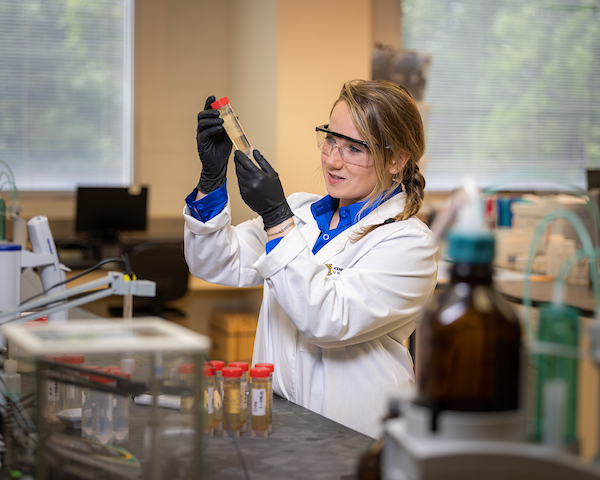Chemistry
Learn More about Chemistry
Admission Requirements
None.
This program does not have specific admission requirements. Only admission to Kennesaw State University is required to declare this major.
General Education Core IMPACTS Curriculum Recommendations for this Major
M: Students should take MATH 1113 or higher.
T: Students should take MATH 1179 or higher.
T: Select two course pairs from the following (8 Credit Hours): CHEM 1211/L, CHEM 1212/L, PHYS 1111/L*, PHYS 1112/L, PHYS 2211/L*, PHYS 2212/L, BIOL 1107/L, or BIOL 1108/L. *Students cannot take both PHYS 1111/L and PHYS 2211/L nor PHYS 1112/L and PHYS 2212/L.
Concentrations Available
Related Minors or Certificates Available
- Chemistry Minor
Sample Classes
-
CHEM 3010: Medicinal Chemistry
This course covers fundamentals of pharmacology such as drug discovery/development and pharmacokinetics, with emphasis given to the role of chemistry and biochemistry in these areas. A main focus of the course will be how drugs function at the molecular level. Examples will be chosen from drugs that target enzymes, receptors, and DNA.
-
CHEM 3500: Biochemistry
This course is a one-semester, lecture-only biochemistry course. Concepts covered include the structure and function of biomolecules, membranes, enzyme kinetics, metabolism and bioenergetics, as well as biological information flow. Intended for chemistry, biology, or biotechnology majors.
-
CHEM 3602: Physical Chemistry: Thermodynamics and Reaction Kinetics
The primary emphasis of this course is on chemical thermodynamics, reaction kinetics and dynamics, and statistical thermodynamics. The course includes physical and chemical properties of real and ideal gases, the laws of thermodynamics and their application to physical and chemical systems, treatment of phase equilibria and chemical equilibria, and extends the application of quantum mechanics to thermodynamics in the development of statistical thermodynamics.
-
CHEM 3800: Forensic Analytical Chemistry
This course covers fundamental topics of forensic analytical chemistry including statistics and data quality, sample preparation, drugs (pharmacology and toxicology), arson and the chemistry of combustion, and trace chemical evidence. Throughout the course, emphasis is placed on modern chemical instrumentation as applied to forensic casework.












